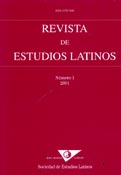Adnominal Genitive and Definiteness in Latin
DOI:
https://doi.org/10.23808/rel.v9i0.87846Keywords:
Genitive. Definiteness. Latin Linguistics.Abstract
This paper tries to find out whether the sequence noun + genitive case in Latin is inherently definite. For this purpose three approaches are adopted: firstly, the comparison of these structures in different languages; secondly, the analysis of some translations from Classical Greek into Latin; and finally the consideration of several examples of Classical Latin. Working on an external and internal study, there is an attempt to classify Latin as one of those languages that, with or without an article, usually interpret a noun accompanied by a genitive case as definite.Downloads
References
M. BASSOLS, Sintaxis latina, Madrid 1963 (= 1956).
G. L. CAMPBELL, Concise Compendium of the World’s Languages, Londres-Nueva York 2000 (= 1991).
B. COMRIE, Universales del Lenguaje y Tipología Lingüística, Madrid 1988 (= 1981), trad. A. Ayuso.
A. ERNOUT y F. T HOMAS, Syntaxe Latine, París 2002 (= 1951).
V. GARCÍA YEBRA, Traducción: historia y teoría, Madrid 1994.
T. GIVÓN, Syntax. A functional-typological introduction, I, Amsterdam-Filadelfia 1984.
J. A. HAWKINS, Definiteness and Indefiniteness: A Study in Reference and Grammaticality Prediction, Londres 1978.
J. KRÁMSKÝ, The article and the concept of definiteness in language, La Haya 1972.
Cf. GIVÓN (1984: 407) y COMRIE (1988: 194).
R. KÜHNER y B. GERTH, Ausführliche Grammatik der griechischen Sprache, Hannover 1976 (=1898 3 ).
B. LÖFSTEDT, «Genetiv und Adjektiv», Syntactica, I 2, Lund 1942a (= 1928), pp. 107-124.
C H . LYONS, «A possessive parameter», Sheffield Working Papers in Language and Linguistics 2 (1985), pp. 98-104.
C H . LYONS, «On the origin of the Old French strong-weak possessive distinction», Transactions of the philological Society 84 (1986a), pp. 1-41.
C H . LYONS, «The syntax of English genitive constructions», JL 22 (1986b), pp. 123-143.
CH . LYONS, Definiteness, Cambridge 1999.
M. MARTÍNEZ P ASTOR, «Adjetivo y genitivo adnominal en latín. Discusión y aportaciones», Durius 2.4 (1974), pp. 221-257.
J. MAUREL, «Le paramètre «absence d’article» en latin», J. David & G. Kleiber (eds.), Déterminants: syntaxe et sémantique. Colloque International de linguistique organise par la Faculté des Lettres et Sciences Humaines de Metz. Centre d’ Analyse Syntaxique, 1984, París 1986 (Recherches linguistiques 11), pp. 203-215.
F. MÜNZER, «Orgetorix», Paulys Realencyclopädie der classischen Altertumwissenschaft, Múnich 1988 (= 1939).
H. PINKSTER, Sintaxis y semántica del latín, Madrid 1995 (= 1984), trad. y actual. M.E. Torrego & J. De La Villa.
H. ROSÉN, «The Definite Article in the Making, Nominal Constituent Order and Related Phenomena», J. Herman (ed.), Linguistic Studies on Latin, Amsterdam 1994, pp. 130-150.
L. RUBIO, Introducción a la Sintaxis Estructural del Latín, Barcelona 1989 (= 1966 I; 1976 II).
E. SCHWYZER y A. DEBRUNNER, Griechische Grammatik, Múnich 1968 4 (= 1938).
J. WACKERNAGEL, Vorlesungen über Syntax, II 2, Basilea 1957 (= 1928 2 ).
D. N. WIGTIL, «Latin Definiteness and English Articles», CW 86.6 (1993), pp. 467-481.
Downloads
Published
How to Cite
Issue
Section
License
Copyright (c) 2009 Revista de Estudios Latinos

This work is licensed under a Creative Commons Attribution-NonCommercial-NoDerivatives 4.0 International License.
The originals published in the printed and electronic editions of this journal are the property of the Revista de Estudios Latinos and can be circulated as long as the original source and authorship is made clear in any reproduction, full or partial, of the same, and as long as this is not done for commercial purposes.






